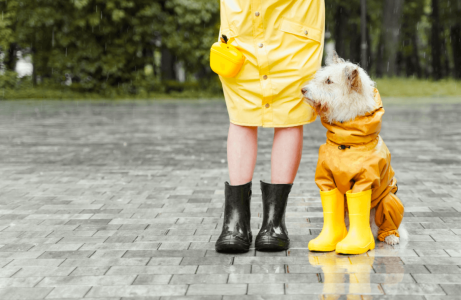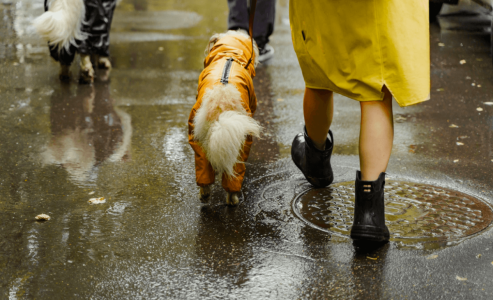This deadly disease is sweeping Australia – YOU and your pets could be at risk
- Replies 5
As the wet weather continues to batter parts of Australia, we want to remind our members about the risks posed by leptospirosis - a potentially deadly disease that is spread through contaminated water.
What is leptospirosis?
Leptospirosis affects both humans and animals and thrives in wet environments like floodwaters.
The disease is spread through the urine of infected animals like rats and can lead to kidney damage, meningitis, liver failure, respiratory distress, and even death in humans. In dogs, it can cause potentially fatal kidney failure and jaundice.
There has been a dramatic rise in cases across NSW in recent years, according to University of Sydney Senior Lecturer in veterinary science Dr Christine Griebsch.
'It started in the City of Sydney, there was then more of a spread to other areas of Sydney and outside, this year has seen a surge of cases on the south coast and also in Newcastle,' she explained.
'There were no recorded cases in dogs since 1976, then one case in 2017, two in 2018, and now there's been 60 cases in the past two years.'
Dr Griebsch attributes this rise partly to La Nina weather conditions which are creating more opportunities for exposure and making it easier for the disease to survive due to increased moisture levels.

Dog owners who reside in high-risk locations such as the south coast and Newcastle are strongly encouraged to vaccinate their pets, but this may not be enough to prevent the spread of the disease.
Rowland Cobbold, an Associate Professor at the University of Queensland, says the vaccine's main flaw is that it isn't completely effective.
'There are about 200 strains of leptospirosis, and the vaccine only covers two. Most of the time dogs don't get those two strains,' he explained.
Not only are pet owners already out of pocket for the immunisations but the treatment for the disease can also add up really quickly. And, with a nationwide vaccine shortage already occurring, it can be difficult to ensure that our four-legged pals are adequately protected!
Even @Maddie had to go through this situation with her vet and she's sharing this to warn others about the need of checking with a vet before your appointment.
'I took my dog Poppy in to get her annual vaccinations. When I called up to book they didn't mention there was any shortage, so I took her in,' she recalled.
'But the vet didn't tell me until I got into the room that she could only get one vaccination today, and they weren't getting the second vaccination until Feb. I had to pay $120 for one vaccination and about two minutes with the vet. I asked which one was more urgent, and they said the one that they don't have…'
'So they could have just told me to wait to come in February?' she went on to say.

How can leptospirosis be prevented?
We believe that most sicknesses and diseases, such as leptospirosis, are best avoided and prevented rather than treated.
Here are some tips to keep in mind:
For dogs, vaccinating them is the most effective way to protect them from contracting the disease. Dogs who live in areas where the disease is common should get vaccinated every year. Have a discussion about immunising your dog with your trusted veterinary care provider.
Here are more ways to minimise their risk of contracting the disease:

Having a dog is a lot of work, but it's worth it because of how much joy they bring into our lives.
We have to make sure they're well-fed, that they get plenty of exercise, and that their coats are clean and free of tangles – just to list a few things.
Still, even the healthiest of dogs can become unwell despite our best efforts, which is why it's crucial to be familiar with potential threats and the symptoms to watch out for.
We sincerely hope that you find this article to be informative, members! We wish you and your beloved furry friends a safe holiday season.
What is leptospirosis?
Leptospirosis affects both humans and animals and thrives in wet environments like floodwaters.
The disease is spread through the urine of infected animals like rats and can lead to kidney damage, meningitis, liver failure, respiratory distress, and even death in humans. In dogs, it can cause potentially fatal kidney failure and jaundice.
There has been a dramatic rise in cases across NSW in recent years, according to University of Sydney Senior Lecturer in veterinary science Dr Christine Griebsch.
'It started in the City of Sydney, there was then more of a spread to other areas of Sydney and outside, this year has seen a surge of cases on the south coast and also in Newcastle,' she explained.
'There were no recorded cases in dogs since 1976, then one case in 2017, two in 2018, and now there's been 60 cases in the past two years.'
Dr Griebsch attributes this rise partly to La Nina weather conditions which are creating more opportunities for exposure and making it easier for the disease to survive due to increased moisture levels.

Your best defence against leptospirosis is an up-to-date immunisation schedule, both for you and your pet every year. Credit: Pexels/Nataliya Vaitkevich.
Dog owners who reside in high-risk locations such as the south coast and Newcastle are strongly encouraged to vaccinate their pets, but this may not be enough to prevent the spread of the disease.
Rowland Cobbold, an Associate Professor at the University of Queensland, says the vaccine's main flaw is that it isn't completely effective.
'There are about 200 strains of leptospirosis, and the vaccine only covers two. Most of the time dogs don't get those two strains,' he explained.
Not only are pet owners already out of pocket for the immunisations but the treatment for the disease can also add up really quickly. And, with a nationwide vaccine shortage already occurring, it can be difficult to ensure that our four-legged pals are adequately protected!
Even @Maddie had to go through this situation with her vet and she's sharing this to warn others about the need of checking with a vet before your appointment.
'I took my dog Poppy in to get her annual vaccinations. When I called up to book they didn't mention there was any shortage, so I took her in,' she recalled.
'But the vet didn't tell me until I got into the room that she could only get one vaccination today, and they weren't getting the second vaccination until Feb. I had to pay $120 for one vaccination and about two minutes with the vet. I asked which one was more urgent, and they said the one that they don't have…'
'So they could have just told me to wait to come in February?' she went on to say.

Our pets are susceptible to leptospirosis, but there are measures we can take to keep them safe. Credit: Pexels/Yaroslav Shuraev.
How can leptospirosis be prevented?
We believe that most sicknesses and diseases, such as leptospirosis, are best avoided and prevented rather than treated.
Here are some tips to keep in mind:
- Avoid flood water and any other water you think might be contaminated.
- Wear protective clothing such as shoes, gloves, goggles, especially when you're with animals, or working in water, soil or mud.
- Cover any cuts and abrasions on your skin with a waterproof dressing.
- Always wash and dry your hands, to prevent infection from spreading.
- Shower thoroughly after working in mud, soil, water or after being around animals you think might be infected.
For dogs, vaccinating them is the most effective way to protect them from contracting the disease. Dogs who live in areas where the disease is common should get vaccinated every year. Have a discussion about immunising your dog with your trusted veterinary care provider.
Here are more ways to minimise their risk of contracting the disease:
- Be careful about letting your pet drink from lakes, rivers, or other natural water sources.
- When going on long walks or hikes with your dog, make sure to bring plenty of fresh water and a dish.
- Don't give your dog any raw meat or organs.
- Protect any cuts or scrapes your dog may have by using waterproof dressings before letting them outside; they may get infected by playing with contaminated water, like flood water or rainwater.
Key Takeaways
- A deadly disease that can kill dogs and their owners, leptospirosis, is rapidly spreading across Australia.
- The disease is spread through the urine of infected animals and can lead to kidney damage, meningitis, liver failure, respiratory distress, and even death in humans.
- Flood-affected areas are at greater risk, and the continuing wet weather could expose more dogs and people.
- The most important risk mitigation strategy is to avoid contact with stagnant water.
We have to make sure they're well-fed, that they get plenty of exercise, and that their coats are clean and free of tangles – just to list a few things.
Still, even the healthiest of dogs can become unwell despite our best efforts, which is why it's crucial to be familiar with potential threats and the symptoms to watch out for.
We sincerely hope that you find this article to be informative, members! We wish you and your beloved furry friends a safe holiday season.








